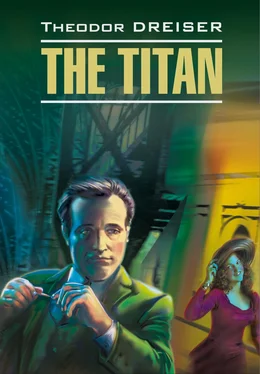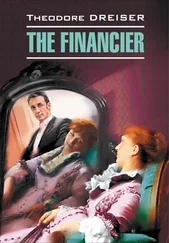Теодор Драйзер - Titan / Титан. Книга для чтения на английском языке
Здесь есть возможность читать онлайн «Теодор Драйзер - Titan / Титан. Книга для чтения на английском языке» — ознакомительный отрывок электронной книги совершенно бесплатно, а после прочтения отрывка купить полную версию. В некоторых случаях можно слушать аудио, скачать через торрент в формате fb2 и присутствует краткое содержание. Город: Санкт-Петербург, Год выпуска: 2008, ISBN: 2008, Жанр: foreign_language, literature_20, foreign_prose, на английском языке. Описание произведения, (предисловие) а так же отзывы посетителей доступны на портале библиотеки ЛибКат.
- Название:Titan / Титан. Книга для чтения на английском языке
- Автор:
- Жанр:
- Год:2008
- Город:Санкт-Петербург
- ISBN:978-5-9925-0202-2
- Рейтинг книги:4 / 5. Голосов: 1
-
Избранное:Добавить в избранное
- Отзывы:
-
Ваша оценка:
- 80
- 1
- 2
- 3
- 4
- 5
Titan / Титан. Книга для чтения на английском языке: краткое содержание, описание и аннотация
Предлагаем к чтению аннотацию, описание, краткое содержание или предисловие (зависит от того, что написал сам автор книги «Titan / Титан. Книга для чтения на английском языке»). Если вы не нашли необходимую информацию о книге — напишите в комментариях, мы постараемся отыскать её.
В книге представлен неадаптированный текст на языке оригинала с сокращениями, снабженный комментариями и словарем.
Titan / Титан. Книга для чтения на английском языке — читать онлайн ознакомительный отрывок
Ниже представлен текст книги, разбитый по страницам. Система сохранения места последней прочитанной страницы, позволяет с удобством читать онлайн бесплатно книгу «Titan / Титан. Книга для чтения на английском языке», без необходимости каждый раз заново искать на чём Вы остановились. Поставьте закладку, и сможете в любой момент перейти на страницу, на которой закончили чтение.
Интервал:
Закладка:
Antoinette Nowak had come to him fresh from a West Side high school and a Chicago business college, and had been engaged as his private stenographer and secretary. This girl had blossomed forth into something exceptional, as American children of foreign parents are wont to do. You would have scarcely believed that she, with her fine, lithe body, her good taste in dress, her skill in stenography, bookkeeping, and business details, could be the daughter of a struggling Pole, who had first worked in the Southwest Chicago Steel Mills, and who had later kept a fifth-rate cigar, news, and stationery store in the Polish district, the merchandise of playing-cards and a back room for idling and casual gaming being the principal reasons for its existence. Antoinette, whose first name had not been Antoinette at all, but Minka (the Antoinette having been borrowed by her from an article in one of the Chicago Sunday papers), was a fine dark, brooding girl, ambitious and hopeful, who ten days after she had accepted her new place was admiring Cowperwood and following his every daring movement with almost excited interest. To be the wife of such a man, she thought – to even command his interest, let alone his affection – must be wonderful. After the dull world she had known – it seemed dull compared to the upper, rarefied realms which she was beginning to glimpse through him – and after the average men in the real-estate office over the way where she had first worked, Cowperwood, in his good clothes, his remote mood, his easy, commanding manner, touched the most ambitious chords of her being. One day she saw Aileen sweep in from her carriage, wearing warm brown furs, smart polished boots, a street-suit of corded brown wool, and a fur toque sharpened and emphasized by a long dark-red feather which shot upward like a dagger or a quill pen. Antoinette hated her. She conceived herself to be better, or as good at least. Why was life divided so unfairly? What sort of a man was Cowperwood, anyhow? <���…>
Cowperwood, engrossed in his own plans, was not thinking of her at present. He was thinking of the next moves in his interesting gas war. And Aileen, seeing her one day, merely considered her an underling. The woman in business was such a novelty that as yet she was d,eclass,e . Aileen really thought nothing of Antoinette at all.
Somewhat over a year after Cowperwood had become intimate with Mrs. Sohlberg his rather practical business relations with Antoinette Nowak took on a more intimate color. What shall we say of this – that he had already wearied of Mrs. Sohlberg? Not in the least. He was desperately fond of her. Or that he despised Aileen, whom he was thus grossly deceiving? Not at all. She was to him at times as attractive as ever – perhaps more so for the reason that her self-imagined rights were being thus roughly infringed upon. He was sorry for her, but inclined to justify himself on the ground that these other relations – with possibly the exception of Mrs. Sohlherg – were not enduring. If it had been possible to marry Mrs. Sohlberg he might have done so, and he did speculate at times as to whether anything would ever induce Aileen to leave him; but this was more or less idle speculation. He rather fancied they would live out their days together, seeing that he was able thus easily to deceive her. But as for a girl like Antoinette Nowak, she figured in that braided symphony of mere sex attraction which somehow makes up that geometric formula of beauty which rules the world. She was charming in a dark way, beautiful, with eyes that burned with an unsatisfied fire; and Cowperwood, although at first only in the least moved by her, became by degrees interested in her, wondering at the amazing, transforming power of the American atmosphere.
“Are your parents English, Antoinette?” he asked her, one morning, with that easy familiarity which he assumed to all underlings and minor intellects – an air that could not be resented in him, and which was usually accepted as a compliment.
Antoinette, clean and fresh in a white shirtwaist, a black walking-skirt, a ribbon of black velvet about her neck, and her long, black hair laid in a heavy braid low over her forehead and held close by a white celluloid comb, looked at him with pleased and grateful eyes. She had been used to such different types of men – the earnest, fiery, excitable, sometimes drunken and swearing men of her childhood, always striking, marching, praying in the Catholic churches; and then the men of the business world, crazy over money, and with no understanding of anything save some few facts about Chicago and its momentary possibilities. In Cowperwood’s office, taking his letters and hearing him talk in his quick, genial way with old Laughlin, Sippens, and others, she had learned more of life than she had ever dreamed existed. He was like a vast open window out of which she was looking upon an almost illimitable landscape.
“No, sir,” she replied, dropping her slim, firm, white hand, holding a black lead-pencil restfully on her notebook. She smiled quite innocently because she was pleased.
“I thought not,” he said, “and yet you’re American enough.”
“I don’t know how it is,” she said, quite solemnly. “I have a brother who is quite as American as I am. We don’t either of us look like our father or mother.”
“What does your brother do?” he asked, indifferently.
“He’s one of the weighers at Arneel & Co. He expects to be a manager sometime.” She smiled.
Cowperwood looked at her speculatively, and after a momentary return glance she dropped her eyes. Slowly, in spite of herself, a telltale flush rose and mantled her brown cheeks. It always did when he looked at her.
“Take this letter to General Van Sickle,” he began, on this occasion quite helpfully, and in a few minutes she had recovered. She could not be near Cowperwood for long at a time, however, without being stirred by a feeling which was not of her own willing. He fascinated and suffused her with a dull fire. She sometimes wondered whether a man so remarkable would ever be interested in a girl like her.
The end of this essential interest, of course, was the eventual assumption of Antoinette. One might go through all the dissolving details of days in which she sat taking dictation, receiving instructions, going about her office duties in a state of apparently chill, practical, commercial single-mindedness; but it would be to no purpose. As a matter of fact, without in any way affecting the preciseness and accuracy of her labor, her thoughts were always upon the man in the inner office – the strange master who was then seeing his men, and in between, so it seemed, a whole world of individuals, solemn and commercial, who came, presented their cards, talked at times almost interminably, and went away. It was the rare individual, however, she observed, who had the long conversation with Cowperwood, and that interested her the more. His instructions to her were always of the briefest, and he depended on her native intelligence to supply much that he scarcely more than suggested.
“You understand, do you?” was his customary phrase.
“Yes,” she would reply.
She felt as though she were fifty times as significant here as she had ever been in her life before.
The office was clean, hard, bright, like Cowperwood himself. The morning sun, streaming in through an almost solid glass east front shaded by pale-green roller curtains, came to have an almost romantic atmosphere for her. Cowperwood’s private office, as in Philadelphia, was a solid cherry-wood box in which he could shut himself completely – sight-proof, sound-proof. When the door was closed it was sacrosanct. He made it a rule, sensibly, to keep his door open as much as possible, even when he was dictating, sometimes not. It was in these half-hours of dictation – the door open, as a rule, for he did not care for too much privacy – that he and Miss Nowak came closest. After months and months, and because he had been busy with the other woman mentioned, of whom she knew nothing, she came to enter sometimes with a sense of suffocation, sometimes of maidenly shame. It would never have occurred to her to admit frankly that she wanted Cowperwood to make love to her. It would have frightened her to have thought of herself as yielding easily, and yet there was not a detail of his personality that was not now burned in her brain. His light, thick, always smoothly parted hair, his wide, clear, inscrutable eyes, his carefully manicured hands, so full and firm, his fresh clothing of delicate, intricate patterns – how these fascinated her! He seemed always remote except just at the moment of doing something, when, curiously enough, he seemed intensely intimate and near.
Читать дальшеИнтервал:
Закладка:
Похожие книги на «Titan / Титан. Книга для чтения на английском языке»
Представляем Вашему вниманию похожие книги на «Titan / Титан. Книга для чтения на английском языке» списком для выбора. Мы отобрали схожую по названию и смыслу литературу в надежде предоставить читателям больше вариантов отыскать новые, интересные, ещё непрочитанные произведения.
Обсуждение, отзывы о книге «Titan / Титан. Книга для чтения на английском языке» и просто собственные мнения читателей. Оставьте ваши комментарии, напишите, что Вы думаете о произведении, его смысле или главных героях. Укажите что конкретно понравилось, а что нет, и почему Вы так считаете.












